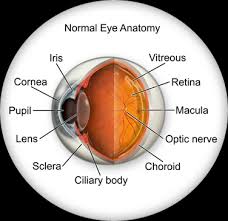Vitamin A has many effects on the body, especially important for eye health. So what effects does vitamin A have on the eyes? Let’s find out through the article below!
1 What is Vitamin A?
Vitamin A is a fat-soluble vitamin that the body cannot synthesize itself and must be supplemented through external products. Vitamin A is essential for vision, stimulates the production of new skin cells, fights some cancers and helps maintain fetal tissue.
Vitamin A is found in both plants and animals. In animals (animal liver, salmon, egg yolks), it exists in the form of retinol and retinyl ester. In plants (carrots, broccoli, etc.), it exists in the form of vitamin A precursors called carotenoids (alpha-carotene and beta-carotene).

Vitamin A plays an important role in the body’s growth and development.
2 Structure of the eye
The eye is an important organ of the body, helping us perceive the world around us through light and color. The eye is made up of parts such as the iris, cornea, pupil, sclera, cornea, conjunctiva, lens, retina, optic nerve and other related parts.
Light from the outside passes through the cornea to the lens, which acts as a lens to control and converge light rays into the eye. The light continues to go to the retina and converts the image into electrical impulses or signals. The retina contains rod cells (cells that help see in low light conditions) and cone cells (cells that detect color). Nerves carry signals from both eyes to the part of the brain responsible for vision.

Detailed structure of the human eye
3 Roles of Vitamin A for the Eyes
Vitamin A plays an important role in eye health and vision function. Here are the roles of vitamin A for the eyes:
- Protects and maintains the cornea and conjunctiva.
- Helps the retina adapt, supporting vision in low light or at night.
- Reduces the risk of eye problems such as dry cornea, macular degeneration, corneal ulcers leading to blindness.
4 Signs of Vitamin A Deficiency in the Body
Symptoms of vitamin A deficiency can vary depending on the severity of the deficiency and the duration of the condition. Here are some symptoms you may experience:
- Dry eyes, blurred vision, night blindness: When vitamin A is deficient, the retinal rod cells reduce the retina’s ability to adapt to darkness.
- A lack of vitamin A will cause itchy, dry, irritated and scaly skin because the sebaceous glands are less active.
- A lack of vitamin A reduces the body’s resistance, making it susceptible to respiratory infections and digestive disorders.
- Causes uneven patches on the whites of the eyes.

Vitamin A deficiency can cause dry eyes, blurred vision, night blindness
5 Ways to Supplement Vitamin A for Healthy Eyes
The Body’s Vitamin A Needs
Vitamin A needs vary depending on many factors such as age, gender, health status, etc. The recommended daily dose of vitamin A for adults is 600 mcg and can be fully supplemented through diet. Pregnant women need to supplement 800 mcg of vitamin A per day. Meanwhile, the vitamin A needs of breastfeeding women can be up to 850mcg/day.
Supplement with food
You can supplement enough vitamin A through your daily diet. Vitamin A is found in many foods, below are some food sources rich in vitamin A:
- Foods of animal origin: animal liver, egg yolk, fish liver oil,…
- Foods of plant origin: carrots, tomatoes, broccoli, bell peppers,..
Supplementation with drugs, functional foods
According to WHO, vitamin A deficiency is the leading cause of preventable blindness in children worldwide.
Mothers can take high doses of vitamin A (200,000 IU) immediately after birth to ensure that breast milk has enough vitamin A for their children. Children under 5 years old who are at risk of vitamin A deficiency such as children with malnutrition, measles, prolonged diarrhea, etc. also need to take high doses of vitamin A.
However, you should consult your doctor before using high doses of vitamin A or you can use functional foods containing vitamin A instead, this is a safer way to supplement vitamins than using high doses.
Vitamin A is essential for the health of the body, especially the eyes and vision function. Supplement vitamin A adequately and properly to increase resistance to protect the body to stay healthy.





